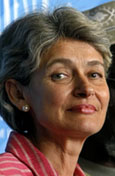Irina Bokova, UNESCO’s director-general, delivered a firm message on Tuesday to representatives from UNESCO’s 58-member executive board assembled at the organization’s Paris headquarters: Bestowing the Obiang International Prize for Research in the Life Sciences, named for and financed by one of the most repressive leaders in Africa, would do grave damage to the organization.
“I have heard the voices of the many intellectuals, scientists, journalists, and, of course, governments and parliamentarians who have appealed to me to protect and preserve the prestige of the organization,” Bokova said. “I have come to you with a strong message of alarm and anxiety.”
The issue of the Obiang prize has been deeply divisive, with the Africa bloc of UNESCO standing firm with President Teodoro Obiang Nguema Mbasogo, the authoritarian and corrupt leader of Equatorial Guinea, despite criticism from France, the EU, and the United States. But the protests from press freedom organizations, UNESCO/Cano World Press Freedom Prize laureates, and, finally, South Africa’s Bishop Desmond Tutu seemed to tip the balance. Realizing that the very credibility of UNESCO was at stake, members of the executive board accepted Bokova’s call for further consultations prior to their next meeting in October. This is diplospeak for “you have three months to come up with a face-saving way of out of this mess.”
While Bokova’s spokeswoman Sue Williams told The Washington Times, “Nobody is talking about scrapping the prize at this point,” the reality is that there is no scenario in which UNESCO can ever award the prize and retain its credibility. The level of international outrage is just too high.
I happened to be in Paris on Monday and Tuesday before the executive board meeting and had an opportunity to speak with senior officials and diplomats within the organization. What was clear to me is that the letters from press freedom organizations and Cano prize laureates were instrumental in helping to make the case against the prize. The fact the five leading African press freedom organization–the Ethiopian Free Press Journalists’ Association, Journaliste en Danger, the Media Foundation for West Africa, the Media Institute of Southern Africa, and the National Union of Somali Journalists–all signed the letter to Bokova was duly noted.
Defenders of press freedom owe a debt of gratitude to the Cano laureates who signed on. They are: Cheng Yizhong; Geoffrey Nyarota; Lydia Cacho; Moníca González; Nizar Nayyouf; Raúl Rivero; and Sonali Samarasinghe Wickrematunge, who signed on behalf of her husband Lasantha, who was murdered in Sri Lanka.
To that list I would like to add the heroic Lebanese journalist May Chidiac, whose endorsement arrived too late for us to include with the original appeal. The fight, however, is far from over, and will be calling on you again between now and October, when the final fate of the Obiang prize is expected to be decided.
